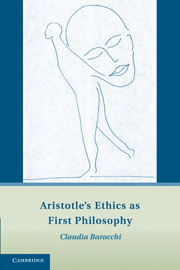Book contents
- Frontmatter
- Contents
- Acknowledgments
- Introduction
- 1 Prelude: Before Ethics. Metaphysics A and Posterior Analytics B.19
- 2 Main Section. Ēthikōn Nikomakheiōn Alpha to Eta
- 3 Interlude. Metaphysics Gamma
- 4 Concluding Section. Ēthikōn Nikomakheiōn Theta to Kappa
- 5 Kolophon
- Selected Bibliography
- Index of Passages
- Index of Subjects and Names
1 - Prelude: Before Ethics. Metaphysics A and Posterior Analytics B.19
Published online by Cambridge University Press: 24 July 2009
- Frontmatter
- Contents
- Acknowledgments
- Introduction
- 1 Prelude: Before Ethics. Metaphysics A and Posterior Analytics B.19
- 2 Main Section. Ēthikōn Nikomakheiōn Alpha to Eta
- 3 Interlude. Metaphysics Gamma
- 4 Concluding Section. Ēthikōn Nikomakheiōn Theta to Kappa
- 5 Kolophon
- Selected Bibliography
- Index of Passages
- Index of Subjects and Names
Summary
Aristotle opens Metaphysics A with a reflection that points to the emergence of ethics, as an explicit discursive articulation, after a long trajectory of human endeavors and inquiries – in fact, as the culmination of the unfolding of human seeking. In the order of knowing, the discourse of ethics will have come onto the scene after those other discussions, including the so-called metaphysical treatises: that which is closest to us, indeed most immediately crucial in and for us, reveals itself last, can be glimpsed at only toward the end of an exploration variously oriented outward, taking us far from ourselves, away from the beginning that we provide and are. The trajectory of such an exploration, thus, in the end leads one back to the previously unquestioned beginning, in order to unravel, to make explicit what was implicit, implied, and implicated in the beginning. In this trajectory the exploration ends up turning upon itself, catching a glimpse of its source and informing principles. It ends up somehow reflecting upon itself.
Thus, out of the “logical,” “physical,” and “metaphysical” texts would emerge the questions of cognition, of the manifold forms of life, of the relation between knowledge and comportment, eventually of the distinctively human. But of course, albeit in an implicit, unthematized fashion, the human would have been in play since the beginning of such investigations, as their very possibility – as the condition silently underlying their discourses.
- Type
- Chapter
- Information
- Aristotle's Ethics as First Philosophy , pp. 16 - 52Publisher: Cambridge University PressPrint publication year: 2007



